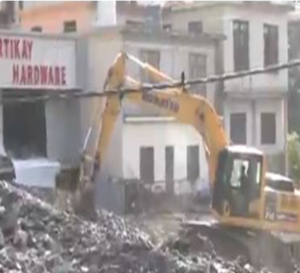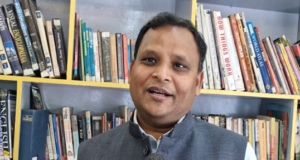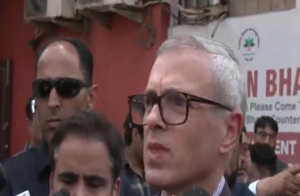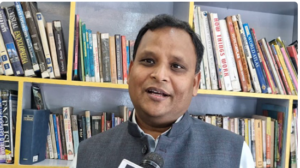Srinagar: Peace returns to old city, thousands converge at Jamia Masjid, observe ‘Laylat-al-Qadr’
Srinagar (Jammu and Kashmir) [India], April 21 (ANI): Thousands of people from different parts of Kashmir converged at Jamia Masjid in Srinagar’s old city to observe ‘Laylat-al-Qadr or the Night of Power’ earlier this week.
It was for the first time in the past three years the authorities allowed night-long prayers at Srinagar’s grand mosque.
One of the holiest nights in Islam falls between the nights of 26-27 of Ramzan passed off peacefully. No untoward incident was reported and devotees offered prayers in peace.
Pertinently, until 1990 thousands of people converged at Srinagar’s grand mosque every Friday and on occasions like Shab-e-Mehraj, Shab-e-Baraat and Shab-e-Qadr to offer congregational prayers.
However, after the Pakistan-sponsored insurgency broke out in J&K in 1990, separatists and terrorists hijacked this important religious centre to preach separatism and sedition.
People in large numbers coming to the grand mosque for congregation prayers provided separatists with a readymade audience to deliver anti-national sermons to appease their masters in the neighbouring country.
The three-decade-long Pakistan-sponsored terrorism in J&K saw henchmen of separatists’ orchestrating protests and stone-pelting around Jamia Masjid.
Frequent disruptions led to a decline in the number of people visiting the grand mosque. Many shopkeepers closed down their establishments due to uncertainty and chaos.
It may be recalled that in 1990, Hizbul Mujahideen terrorists murdered Kashmir’s chief cleric, Mirwaiz Mohammad Farooq at his residence at Nageen in Srinagar outskirts.
The cold-blooded murder of the late Mirwaiz was carried out at the behest of Pakistan.
The message was clear that Srinagar’s grand mosque would be controlled by the hardliners and anyone opposing the move will have to face the consequences.
In June 2017, when the son of the late Mirwaiz Moulana Mohammad Farooq, Mirwaiz Umar Farooq was delivering a sermon on the revered night of ‘Laylat-al-Qadr’ an unruly mob lynched, a Deputy Superintendent of Police, Mohammad Ayub Pandit and stoned him to death outside the historic Jamia Masjid at Nowahata.
DySP Pandit was posted outside the mosque during ‘Shab-e-Qadr’ and was doing his duty standing at the access control of the mosque when he was attacked and killed.
The brutal murder of the police officer evoked widespread condemnation from every section of society.
J&K Police later arrested the accused persons who led the attack to lynch DySP Pandit.
In December 2018, a group of masked young men stormed into the Jamia Masjid with ISIS flags and created a ruckus.
The incident occurred after the Friday congregational prayers.
The group carrying ISIS flags barged into the mosque and rushed to the pulpit. One of them stood atop the pulpit with his shoes on, shouting slogans.
Till August 5, 2019 – when the Centre announced its decision to abrogate J&K’s special status and bifurcate it into two Union Territories – Srinagar’s grand mosque was considered to be the citadel of the separatists.
Chairman of his faction of the so-called Hurriyat Conference, Mirwaiz Umar Farooq, who also heads the Anjuman Auqaf Jamia Masjid (managing committee of the grand mosque), acted as a spectator and couldn’t do much to uphold the integrity of this historic religious institution.
Kashmir-based politicians, who ruled Jammu and Kashmir after 1990, made half-hearted attempts to stabilize the situation as they didn’t want to annoy Pakistan and their stooges in the Himalayan region.
After 2019 the security agencies tightened the noose around the anti-national elements. A massive crackdown was launched to nab the henchmen of Pakistan stooges in the old city.
These elements are used to lure the youngsters by offering them Rs 500 to pelt stones on the security personnel and disrupt normal life.
Efforts put in by Jammu and Kashmir Police and the paramilitary forces have yielded results.
The participation of thousands of people in “Shab-e-Qadr (Night of Power)’ recently is ample proof of the fact that peace has been established in the volatile old city of Srinagar.
Ahead of Eid-ul-Fitr this year markets around Jamia Masjid are abuzz with activities and people are thronging the area without any fear of getting caught in stone-pelting or facing any harassment at the hands of miscreants.
Peace has returned to Srinagar’s old city. The government has succeeded in restoring the pristine glory of the 610-year-old grand mosque, which can accommodate more than 33,000 people at one time.
The Jamia Masjid known for its peaceful and tranquil ambience is glittering again.
The message is loud and clear that no one in J&K would be allowed to use religious centres for promoting vested interests. People converge at religious places to seek solace and pray in peace, and they are least interested in politics.
In the past three years, Srinagar has changed.
Its youth have given up the path of violence. No one is being arrested for indulging in stone pelting as no stone pelters are left. Terrorism is on its last legs with the number of terrorists falling below the 70-mark.
The beginning of the end of the Pakistan-sponsored proxy war has commenced.
J&K residents are heaving a sigh of relief in the terror and tension-free atmosphere.
Peace returning to the old city is an indication that the era of bloodshed is over and a new dawn has broken out in Jammu and Kashmir.






